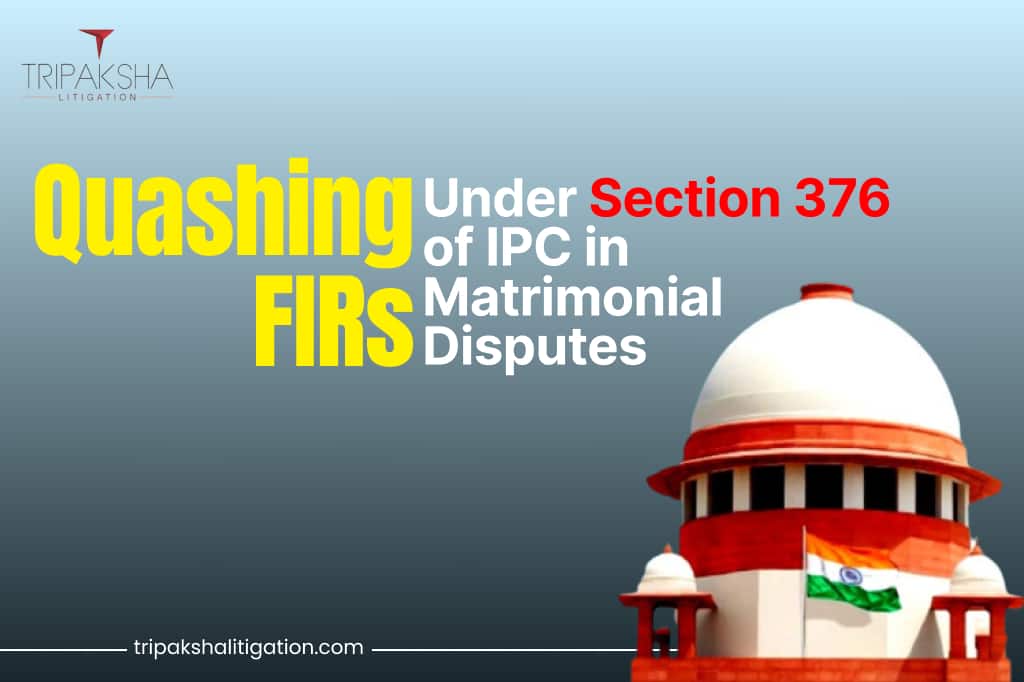Introduction:
Within the labyrinthine domain of matrimonial disputes, the specter of spurious accusations looms ominously. Notably, the instrument of choice in such disputes is often the filing of First Information Reports (FIRs) under Section 376 of the Indian Penal Code (IPC), which pertains to allegations of rape. The recent landmark adjudication in Arshad Ahmad v. State NCT of Delhi has offered discerning insights into the prospect of dismantling such FIRs through legal stratagem. This exposition delves into the intricacies of this precedent-setting case and unveils the meticulous strategies requisite to assiduously invalidate an FIR under Section 376 of IPC lodged within the crucible of matrimonial discord.
Decoding Section 376 of IPC
Section 376 of the IPC constitutes a formidable legal provision, as it broaches the subject of rape, an offense carrying grave ramifications both in terms of imputed culpability and its concomitant legal repercussions. In the context of matrimonial disputes, it is a disconcerting reality that one party might weaponize allegations of rape to gain an inordinate advantage in divorce or child custody proceedings.
Arshad Ahmad v. State NCT of Delhi: A Pivotal Judicial Pronouncement
The litigation of Arshad Ahmad v. State NCT of Delhi assumes a pivotal position within this legal milieu. In this adjudication, Arshad Ahmad, the accused, found himself ensnared in the coils of rape accusations levied by his estranged spouse amid the throes of their acrimonious divorce proceedings. With admirable sagacity, the defendant, in concert with his legal representation, endeavored to effectuate the quashing of the FIR, contending that it was an unequivocal instance of the abuse of legal process to settle personal vendettas.
The Delhi High Court, in a meticulous and erudite judgment, undertook a comprehensive exegesis of the case’s multifarious dimensions. Ultimately, the court decreed the quashing of the FIR, an outcome underpinned by a discerning appreciation of the complainant’s inconsistent assertions and the conspicuous dearth of substantive corroboration. Notably, the court discerned a retaliatory motive in the complaint, discerning it as a maneuver designed to exert unwarranted pressure on the accused in the crucible of the matrimonial discord. This seminal judgment underscores the imperativeness of an incisive scrutiny of the veracity of such FIRs and their nexus to concurrent matrimonial disputes.
Strategies to Efface an FIR under Section 376 in Matrimonial Turmoil
1. Prudent Legal Counsel: The first cardinal stride towards the annulment of an FIR filed under Section 376 in matrimonial imbroglios is the enlistment of legal representation possessed of discernible competence and acumen. Such legal cognoscenti are invaluable in their capacity to meticulously assess the probative weight of the case and to architect an efficacious legal stratagem accordingly.
2. Evidentiary Assemblage: The accused ought to collaborate closely with their legal retinue in the meticulous compilation of evidentiary materials that repudiate the allegations. Such materials may encompass communication records, witness depositions, or any other probative documentation germane to the case’s exigencies.
3. Substantiating Mala Fide Intent: The ineluctable corollary is the establishment of a mala fide intent underpinning the FIR, demonstrating a malicious machination rather than the imputation of genuine culpability. This entails a meticulous elucidation of incongruities inherent within the complainant’s statements or the marshaling of concrete evidence to substantiate ulterior motives.
4. Exploration of Negotiation and Mediation: In select cases, the expediency of negotiation or mediation as a viable recourse to amicably resolve the underlying matrimonial dispute cannot be gainsaid. Such deliberations may culminate in the withdrawal of the FIR, thereby fostering conciliation.
5. The Quashing Petition Gambit: When the evidence manifestly corroborates the malevolent character of the FIR and its patent paucity of merit, the strategic filing of a quashing petition under Section 482 of the Code of Criminal Procedure (CrPC) before the High Court becomes an imperious necessity. Such a petition, buttressed by cogent legal arguments and irrefutable evidence, constitutes a formidable instrument to vindicate the rights and rectitude of individuals ensnared within the quagmire of false accusations.
Conclusion
The adjudication in Arshad Ahmad v. State NCT of Delhi reverberates as a lodestar for individuals ensnared within the quagmire of false rape accusations within the crucible of matrimonial discord. It accentuates the exigency of a judicious and scrupulous evaluation of the accusations prior to embarking upon the legal odyssey. Although the trajectory to quash such FIRs may be riddled with challenges, it remains unequivocally navigable. With the judicious engagement of adept legal representation and the judicious construction of a robust defense underpinned by evidentiary rigor, individuals can insulate their rights and reputation against the deleterious impact of unfounded accusations.








